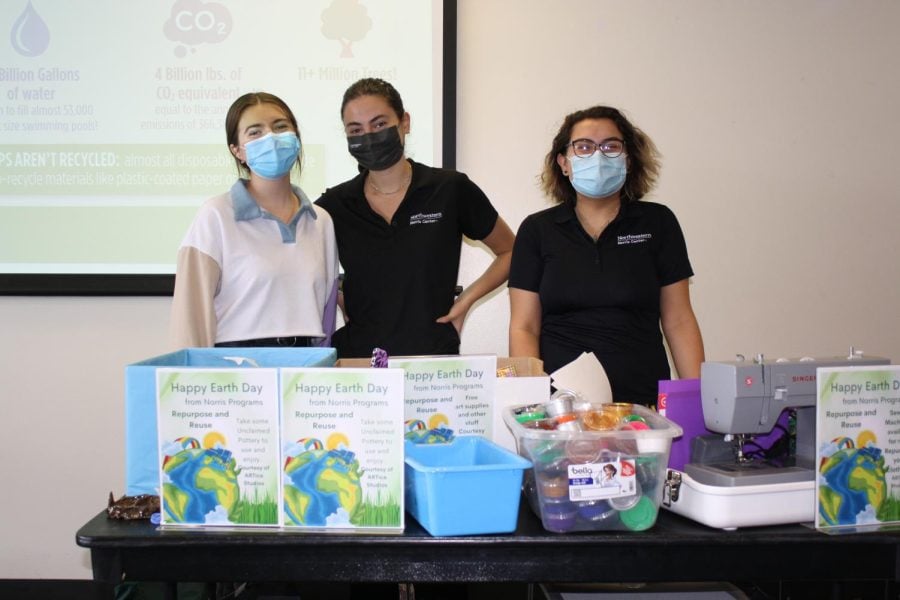SustainNU hosts Repair & Reuse Fair to promote campus sustainability
Rebecca Shaid/The Daily Northwestern
Various campus and local organizations hosted booths at sustainNU’s Repair & Reuse fair on Wednesday.
April 20, 2022
First-year chemical engineering graduate student Sarah Friedman sorted through a box of reusable pottery and picked out pieces to take home at Wednesday’s Repair & Reuse Fair hosted by sustainNU.
“(I practice sustainability by) trying to recycle as much as I can, and I try to reuse my containers as much as possible,” Friedman said. “I feel like there’s always something more you could do. And I’ve learned that by coming to this fair.”
The fair, hosted at Norris University Center, aimed to place emphasis on reusing and reducing waste, according to sustainNU’s Associate Director Julie Cahillane. It featured booths showcasing a range of campus initiatives, student startups and local organizations. Apart from learning about different projects, students could also repair their own items with sewing services or take home reusable goods like water bottles.
Cahillane said though it can be difficult for students to implement sustainable habits in their routines, she hopes the fair showed students applying simple changes is easy.
“It isn’t hard to be more sustainable,” Cahillane said. “When you look at your own lifestyle … you’re probably already doing some things that are more sustainable. So recognize that and appreciate, ‘Okay, I’ve got this one thing down, I ride my bike everywhere. But what else can I do?’”
Madeline Amonick, Hillel’s social justice fellow, ran a booth for Cats Who Compost, a student initiative promoting composting efforts on campus.
The group has two compost centers on campus where students drop off a variety of items and is looking to establish a third center, Amonick said. The compost then goes to Collective Resource Compost, where it turns into nutrient-rich soil.
“Something we see as really important for Cats Who Compost is to help change the culture around composting,” Amonick said. “(Collective) can compost way more materials than if you just did it in your backyard, like meats, bones, hair … the reason why people don’t know is because they don’t realize they can do this.”
Second-year business graduate student Kate Sanner ran a booth for Beni, a web extension for secondhand clothing options. After struggling to thrift clothing she liked, Sanner said she joined Beni to help fill a gap in the sustainable fashion industry.
The extension allows users to shop directly on their favorite retailers’ websites, but provides a list of alternative secondhand options related to the new items the customer selects. Users can then see similar clothing items on online thrift platforms.
Sanner said before recycling material, the most sustainable practice is to use an item for as long as possible.
“We want to make sure that as many people can use an item while it’s still in good condition, and resale is really the way to do that,” Sanner said. “But we want to make it easy.”
Vivek Doshi, board president and assistant executive director of the Chicago Tool Library, also ran a booth. The community-based organization runs a pay-what-you-can membership program and loans tools out to members for a week at a time.
Apart from classic tools, the library also provides cooking appliances and camping gear, Doshi said.
“We think that everyone should have access to the ability to determine the space around them,” Doshi said. “That involves offering tools and expertise.”
Even though individual effort is important in sustainability initiatives, Cahillane said she recognizes corporations need to make bigger changes. On campus, sustainNU is working to reduce operational energy consumption, and NU is engaging in global climate research efforts, she said.
However, she said thinking about small changes is a good place to start.
“If you do it and everyone else in your residence or your apartment building or your town or your country starts to do it, then that becomes the same as a corporation,” Cahillane said. “It’s a collective, expanding effort when we all do our part.”
Email: [email protected]
Twitter: @joannah_11
Related Stories:
— Where does Northwestern’s food waste go?
— Northwestern Dining launches more sustainable to-go container program
— Cookies for Compost makes composting more accessible along with a sweet incentive


